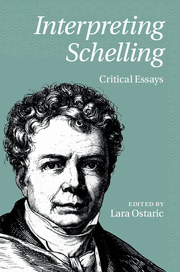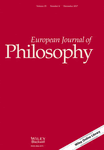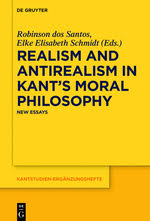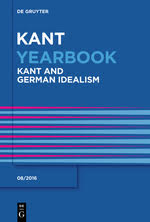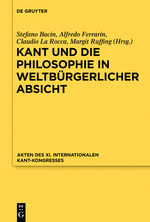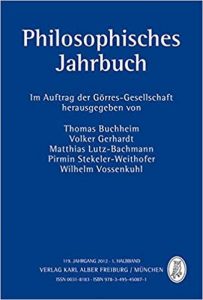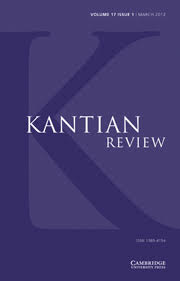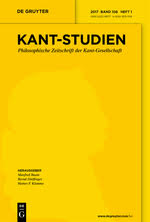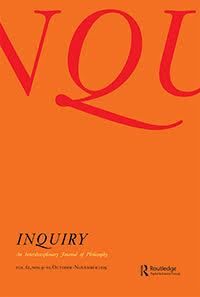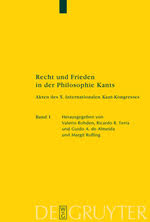Current Research
I am currently writing a monograph tentatively titled “Genius, Creativity, and the Progress of Culture: Kantian Perspectives on Early German Romanticism,” where I focus on what I take is the defining thought of Early German Romanticism—poetry as the pinnacle of philosophical thinking and an instrument without which philosophical pursuit remains incomplete. I will further contend that the Early Romantic characterization of the highest act of reason as poiesis, creative production, is best understood as their reaction to Immanuel Kant’s Critical philosophy.
Monograph
The Critique of Judgment and the Unity of Kant’s Critical System, Cambridge University Press, July 2023.
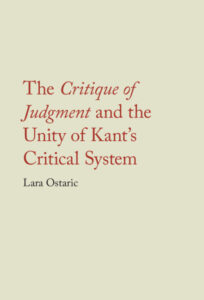
In this book, I argue that Kant’s Critique of Judgment is properly understood as completing his Critical system. The two seemingly disparate halves of the text are unified under this larger project insofar as both aesthetic and teleological judgment indirectly exhibit the final end of reason, the Ideas of the highest good and the postulates, as if obtaining in nature. The book is divided into three parts. Part I, “The Highest Good and the Postulates,” situates the project of the third Critique more generally, that is, within the context of the problem of the unity of reason and the Idea of the highest good. In Part II, “Aesthetic Judgment and the ‘Moral Image’,” I show how for Kant aesthetic experience more specifically serves the function of representing the highest good as the final end of nature. While Part II demonstrates how aesthetic judgment connects freedom and nature at the level of our sensibility, in Part III, “Teleological Judgment and the Moral Image,” I show how teleological judgment for Kant connects freedom and nature at the level of our cognition of nature and life.
Edited Volume
Interpreting Schelling: Critical Essays, Cambridge: Cambridge University Press, 2014. Paperback edition: April 2018.
This book is the first collection of essays on Schelling in English that systematically explores the historical development of his philosophy. It addresses all four periods of Schelling’s thought: his Transcendental Philosophy and Philosophy of Nature, his System of Identity [Identitätsphilosophie], his System of Freedom, and his Positive Philosophy. The essays examine the constellation of philosophical ideas that motivated the formation of Schelling’s thought, as well as those later ones for which his philosophy laid the foundation.
Journal Articles and Book Chapters
18. “Kant on Fine Arts, Genius, and Aesthetic Ideas,” in Cambridge Companion to Kant’s Critique of Judgment, ed. by Kristi Sweet, Cambridge: Cambridge University Press (forthcoming 2025).
17. “Artistic Genius and Aesthetic Reflection in the Philosophy of Arthur Schopenhauer,” in Cambridge Companion to Arthur Schopenhauer, ed. by Sandra Shapshay and Colin Marshall, Cambridge: Cambridge University Press (forthcoming 2024).
16. “Schelling’s Principle of Life and the Unity of Mind and Nature,” in Living Ideas, ed. by Peter Cheyne, Berlin/Heidelberg: Springer Verlag (forthcoming 2024).
15. “Kant’s Moral Proof for God’s Existence in the Critique of the Power of Judgment,” in Kant on Proofs for God’s Existence, ed. by Ina Goy, Berlin: Walter de Gruyter, 2023, 119-140.
14. “Organisms as ‘Natural Ends’ and Reflecting Judgment’s Image of Externalized Freedom,” The Court of Reason: Proceedings of the 13th International Kant Congress, Berlin: Walter de Gruyter, 2021, 971-981.
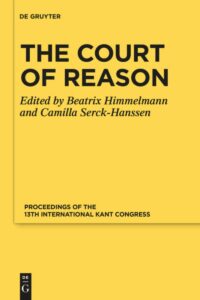
13. “Regaining Subjectivity in Absolute Freedom: Schelling’s Ontological Extension of Kant’s Radical Evil in the Freiheitsschrift,” in Thomas Buchheim, Thomas Frisch, Nora C. Wachsmann (eds.), Schellings Freiheitsschrift—Methode, System, Kritik, Tübingen: Mohr-Siebeck Verlag, 2021, 193-213. 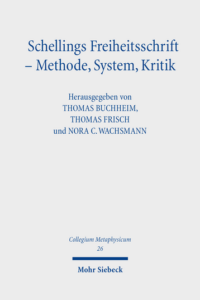
12. “Nature as a World of Action, Not of Speculation: Schelling’s Critique of Kant’s Postulates in His Philosophical Letters on Dogmatism and Criticism (1795).” In: Freedom, Nature, and Systematicity: Essays on F.W.J. Schelling, edited by Anthony G. Bruno, Oxford: Oxford University Press 2020, 11-32.
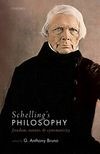
11. “The Free Harmony of the Faculties and the Primacy of Imagination in Kant’s Aesthetic Judgment,” European Journal of Philosophy 25.4, 2017, 1376-1410.
- “Practical Cognition, Reflective Judgment, and the Realism of Kant’s MoralGlaube.” In: Realism and Antirealism in Kant’s Moral Philosophy, edited by Robinson dos Santos and Elke Elisabeth Schmidt,Kant-Studien Ergänzungshefte, Walter de Gruyter, 2017, 89-115.
9. “Creating the Absolute: Kant’s Conception of Genial Creation in Schlegel, Novalis and Schelling,” Kant Yearbook: Kant and German Idealism, vol. 8, 2016, 63-85.
8. “Editor’s Introduction,” In: Interpreting Schelling: Critical Essays, Cambridge: Cambridge University Press, 2014, 1-9.
7. “The Concept of ‘Life’ in Early Schelling.” In: Interpreting Schelling: Critical Essays, Cambridge: Cambridge University Press, 2014, 48-70.
6. “Aesthetic Judgment and the Completion of Kant’s Critical System.” In: Kant and Philosophy in a Cosmopolitan Sense. Proceedings of the Eleventh International Kant Congress, edited by Claudio La Rocca et al., Berlin/NY: de Gruyter, 2013, 679-691.
5. “Absolute Freedom and Creative Agency in Early Schelling,” Philosophisches Jahrbuch 119.1, 2012, 69-93.
4. “Kant on the Normativity of Creative Production,” Kantian Review 17.1, 2012, 75-107.
3a. “Works of Genius as Sensible Exhibitions of the Idea of the Highest Good,” Kant-Studien 101.1, 2010, 22-39.
3b. A Chinese translation of the same article appeared under the title “Beyond Originality and Exemplarity: A Reinterpretation of Kant’s Concept of Artistic Creation,” Journal of Northwest University:Philosophy and Social Sciences Edition 2.44, 2014, 20-28.
2. “Kant’s Account of Nature’s Systematicity and the Unity of Theoretical and Practical Reason,” Inquiry 52.2, 2009, 155-178.
- “Genius and the ‘Moral Image of the World’ – The Artist and Her Work as a Source of Moral Motivation.” In: Recht und Frieden in der Philosophie Kants. Akten des X. Internationalen Kant-Kongresses, edited by Valerio Rohden et al., Berlin/NY: de Gruyter, 2008, 3, 687-696.
